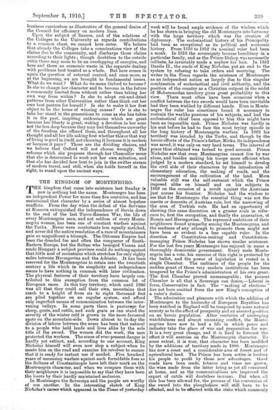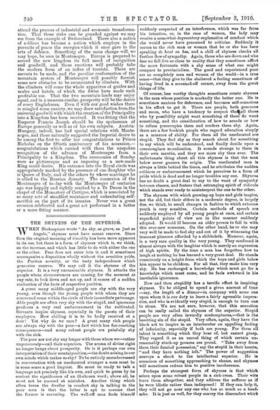THE KINGDOM OF MONTENEGRO.
MHE kingdom that came into existence last Sunday is new in nothing but the name. Montenegro has been an independent Power for more than five centuries, and has maintained that character by a series of almost hopeless conflicts. From the day when the defeat of the Servians at Kossova extinguished the independence of Servia down to the end of the last Turco-Russian War, the life of every Montenegrin man, and not seldom of every Monte- negrin woman, has been one of constant warfare against the Turks. Never were combatants less equally matched, and never did the native resolution of a race of mountaineers gain so magnificent a triumph. The Ottoman Empire had been the dreaded foe and often the conqueror of South- Eastern Europe, but the Sultan who besieged Vienna and made Hungary a subject province could do nothing against that little nest of mountains which stretches for only eighty miles between Herzegovina and the Adriatic. It has been reserved for the Montenegrins to retain into the twentieth century a life which in its simplicity and independence seems to have nothing in common with later civilisation. The physical features of their territory have largely con- tributed to this exemption from the common lot of European races. In this tiny territory, which until 1880 was all that they could call their own, mountains that reach to a height of from six to eight thousand feet are piled together on no regular system, and afford only imperfect means of communication between the inter- vening valleys. In some parts there is pasturage for sheep, goats, and cattle, and such grain as can stand the severity of the winter cold is grown in the more favoured spots on the mountain-side. Down almost to to-day the division of labour between the sexes has been that natural to a people who held lands and lives alike by the sole title of the sword. The women did the work, the men protected the workers. The sense of ever-present danger is hardly yet extinct, and, according to one account, King Nicholas himself will even now stop a subject when he meets him on the road and examine his revolver to ensure that it is ready for instant use if needed. Five hundred years of unceasing warfare against such formidable foes as the Sultans of Constantinople have left their mark on the Montenegrin character, and when we compare them with their neighbours it is impossible to say that they have been the losers by their hardly maintained seclusion. . In Montenegro the Sovereign and the people are worthy of one another. -In the . interesting .sketch , of King Nicholas's career which appeared. in the Times of yesterday- week will be found ample evidence of the wisdom which he has shown in bringing the old Montenegro into harmony with the large territory which was the creation of diplomacy. The ecclesiastical history of. his Principality had been as exceptional as its political and economic history. From 1516 to 1852 its nominal ruler had been a monk. In 1616 the sovereignty became hereditary in a particular family, and as the Prince-Bishop was necessarily celibate, he invariably made a nephew his heir. In 1852 Danilo H., the uncle of King Nicholas, put an end to the system by refusing to take orders and marrying. The writer in the Times regards the existence of Montenegro as an independent nation as largely due to this singular combination of ecclesiastical and civil authority, and the position of the country as a Christian outpost in the midst of Mohammedan territory gives great probability to this view. There must often have been occasions when a conflict between the two swords would have been inevitable had they been wielded by different hands. Even in Monte- negro the ruler has sometimes found it necessary to restrain the warlike passions of his subjects, and had the ecclesiastical chief been opposed to him this might have been an impossible task. Prince Nicholas was hardly in his seat before he had to face the most trying episode in the long history of Montenegrin warfare. In 1862 his territory was invaded by the Turks, and though by the heroic efforts of the Prince's father, Mirko, its independence was saved, it was only on very hard terms. The interval of peace thus obtained was turned to good account. Prince Nicholas saw that even Montenegrins cannot live by war alone, and besides making his troops more efficient when judged by a modern standard, he set himself to develop the civil side of their characters by the introduction of elementary education, the making of roads, and the encouragement of the cultivation of the land. More valuable still was the self-restraint which the Prince imposed alike on himself and on his subjects in 1869 on the occasion of a revolt against the Austrians just across his frontier. Nicholas had. the wisdom to see that for Montenegro the essential thing was not the merits or demerits of Austrian rule, but the narrowing of the area of Turkish rule. He had an opportunity of showing this same discretion on a greater scale in refer- ence to, first the occupation, and Email), the annexation, of Bosnia and Herzegovina.. The repressed ambitions of their neighbours found sympathy among the Montenegrins, and the madness of any attempt to promote them might not have been so evident to a less capable ruler. In the direction of Constitution-making and Constitution- managing Prince Nicholas has shown similar acuteness. For the last five years Montenegro has enjoyed in name a thoroughly democratic government. Every male Monte- negrin has a vote, his exercise of this right is protected by the ballot, and the power of legislation is vested in a single Chamber. The unfitness of the people for the sudden grant of these very modern institutions has been tempered by the Prince's administration of his own grant. The first Chamber proved unmanageable ; the present Chamber is all that a Sovereign can desire,—Liberal in form, Conservative in fact. The "making of elections" has not been omitted from the new King's conception of a ruler's duties.
The admiration and pleasure with which the addition of Montenegro to the hierarchy of European Royalties has been watched in England will be tempered by some natural anxiety as to the effect of prosperity and an assured position on an heroic population. After centuries of unsleeping watchfulness and almost unceasing conflict, the Monte- negrins have now to lead a life in which peace and industry take the place of war and preparation for war. It is a very great change, and it is hard to forecast the effect it will exercise on the Montenegrin character. To some extent, it is true, that character has been modified by the additions of territory made in 1880. Montenegro has now a coast and a considerable area of forest and of agricultural land. The Prince has been active in leading his people to profit by these new advantages. Good roads have been made, tobacco and vines are grown, the wine made from the latter being as yet all consumed at home, and as the communications are improved the export of cattle will doubtless increase. But when all this has been allowed for, the process of the conversion of. the sword inte the ploughshare. will still, have to. be effected, and to be effected with•the risks which commonly attend the process of industrial and economic transforma- tion. That these risks can be guarded against we may see from the example of Switzerland. There also a nation of soldiers has become a nation which employs in the pursuits of peace the energies which it once gave to the arts of defence. Something of the same change will, we may hope, be seen in Montenegro. Europe is prepared to accord the new kingdom its full meed of recognition and goodwill, and these emotions will probably take the modern form of an influx of tourists. There are ascents to be made, and the peculiar conformation of the mountain system of Montenegro will possibly furnish some new obstacles to be surmounted by climbers. With the climbers will come the whole apparatus of guides and mules and hotels, of which the Swiss have made such profitable use. That the two mountain-lands may enjoy equal, and in a measure similar, prosperity will be the desire of every Englishman. Even if with our good wishes there is mingled some anxiety, we may draw satisfaction from the universal goodwill with which the creation of the Principality into a Kingdom has been received. It was fitting that the Emperor Francis Joseph should be the spokesman of Europe generally as well as of his own subjects. Austria- Hungary, indeed, has had special relations with Monte- negro, and these naturally suggested the Imperial desire to be among the first to offer her congratulations to Prince Nicholas on the fiftieth anniversary of his accession,— congratulations which carried with them the unspoken recognition of the advance of Montenegro from a Principality to a Kingdom. The ceremonies of Sunday were as picturesque and as imposing as a new-made King could desire. His entrance into the Royal circle was appropriately marked by the presence of one daughter who is Queen of Italy, and of the others by whose marriages he is allied to the Russian dynasty. The connexion of the Montenegro of to-day with the Montenegro of centuries ago was happily and rightly marked by a Te Deum in the chapel of the Monastery of Cettigne, which is associated by so many acts of steadfast resistance and unhesitating self- sacrifice on the part of its inmates. Never was a great occasion celebrated and a great act performed in a better or a more fitting manner.











































 Previous page
Previous page